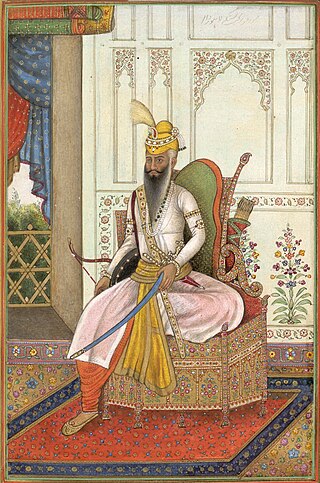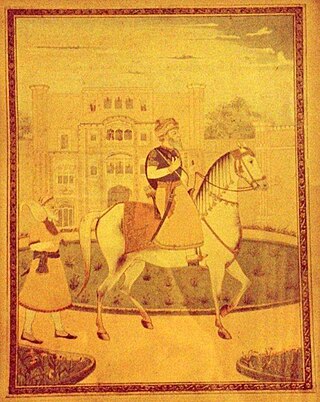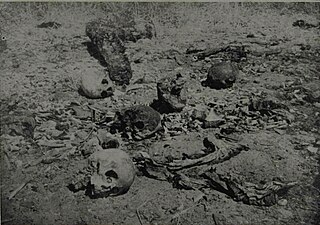
Ranjit Singh, popularly known as Sher-e-Punjab or "Lion of Punjab", was the first Maharaja of the Sikh Empire, which ruled the northwest Indian subcontinent in the early half of the 19th century. He survived smallpox in infancy but lost sight in his left eye. He fought his first battle alongside his father at age 10. After his father died around Ranjit's early teenage years, Ranjit subsequently fought several wars to expel the Afghans throughout his teenage years. At the age of 21, he was proclaimed the "Maharaja of Punjab". His empire grew in the Punjab region under his leadership through 1839.
The Punjabis, are an Indo-Aryan ethnolinguistic group associated with the Punjab region, comprising areas of eastern Pakistan and northwestern India. They generally speak Standard Punjabi or various Punjabi dialects on both sides.

Khushwant Singh was an Indian author, lawyer, diplomat, journalist and politician. His experience in the 1947 Partition of India inspired him to write Train to Pakistan in 1956, which became his most well-known novel.
Surat Shabd Simran is a type of spiritual meditation in the Sant Mat tradition.

The Shiromani Gurdwara Parbandhak Committee is an organization in India responsible for the management of Gurdwaras, Sikh places of worship in states of Punjab and Himachal Pradesh and the union territory of Chandigarh. SGPC also administers Darbar Sahib in Amritsar.
Magistrate, MP, Sardar Bahadur, Sir Sobha Singh, CBE was an Indian civil contractor, prominent builder and real estate developer of the modern day Delhi.

Sultan-ul-Qaum Sardar Jassa Singh Ahluwalia was a Sikh leader during the period of the Sikh Confederacy, being the Supreme Leader of the Dal Khalsa. He was also Misldar of the Ahluwalia Misl. This period was an interlude, lasting roughly from the time of the death of Banda Bahadur in 1716 to the founding of the Sikh Empire in 1801. He founded the Kapurthala State in 1772.
Randhawa is a Jat clan found in the Punjab region of India and Pakistan. The Randhawa name has special significance in the history of the Sikh faith, the first appointed Granthi was a Randhawa There are also adherents of Hinduism and Islam belonging to the Randhawa clan.
Sardar Bhuma Singh Dhillon was a royal Jat Sikh warrior of the 18th century in Punjab and the second leader of the Bhangi Misl succeeding Sardar Chhajja Singh.
Girilal Jain was an Indian journalist. He served as the editor of The Times of India from 1978 until 1988. He advocated establishing old glory and re establishing the great tenets of Hinduism aligned with nationalism and authored books on the subject, the best known of which, The Hindu Phenomenon, was published posthumously. The government of India awarded him the civilian honour of the Padma Bhushan in 1989. He is accused by Congressional records of being vituperative towards Sikhs in editorial named "De-Turbaning of Sikhs".
The Sikhs are adherents to Sikhism, the fifth largest organized religion in the world, with around 25 million adherents. Sikh History is around 500 years and in that time the Sikhs have developed unique expressions of art and culture which are influenced by their faith and synthesize traditions from many other cultures depending on the locality of the adherents of the religion. Sikhism is the only religion that originated in the Punjab region with all other religions coming from outside Punjab. All the Sikh gurus, many saints, and many of the martyrs in Sikh history were from Punjab and from the Punjabi people. Punjabi culture and Sikhism are mistakenly considered inseparably intertwined. "Sikh" properly refers to adherents of Sikhism as a religion, strictly not an ethnic group. However, because Sikhism has seldom sought converts, most Sikhs share strong ethno-religious ties, therefore it is a common stereotype that all Sikhs share the same ethnicity. Many countries, such as the U.K., therefore misconcievingly recognize Sikh as a designated ethnicity on their censuses. The American non-profit organization United Sikhs has fought to have Sikhs included on the U.S. census as well, arguing that Sikhs "self-identify as an 'ethnic minority'" and believe "that they are more than just a religion".
Hadali is a town located in Khushab District in the Punjab Province of Pakistan. The town is administratively subdivided into two Union Councils, including Hadali-Ii.

Bhapa or (Bhaapa) is a term used in Punjab by the members of the Sikh community in a pejorative sense for Sikhs that migrated from Pakistan after the Partition of India in 1947. The term derives from the local Rawalpindi dialect of Punjabi.

The Bhangi Misl was a large and powerful Sikh Misl headquartered in Amritsar. It was founded in the early 18th century by Sardar Chhajja Singh Dhillon, who was baptised by Banda Singh Bahadur. The misl received its name "Bhangi" because Chhajja Singh and his soldiers frequently used the herbal intoxicant bhang. It was a first misl to established a Khalsa Raj and publish Khalsa currency coins. The Bhangi Kingdom/Misl was founded by Dhillon Jats.

Santa Banta Pvt. Ltd. is a 2016 Bollywood spy-comedy film directed by Akashdeep Sabir, produced by Viacom 18 and distributed by Viacom 18 and Cinetek Telefilms. The film features Vir Das, Boman Irani, Lisa Haydon and Neha Dhupia in leading roles.

Nirmala also known as Nirmala Saṁpardā or Nirmal Paṅth, is a Sikh sect of ascetics. According to the traditional beliefs, the Sanatan Nirmala Sikh tradition was founded by Guru Gobind Singh in late 17th century when he sent five Sikhs to Varanasi to learn Sanskrit and Vedanta texts.
Shugli–Jugli, also known as Shugli Jodi, is a stand-up comedy duo consisting of brothers Shugli and Jugli. The team is primarily known for comedy. It has been associated with Doordarshan since 1988 and has appeared in eight hundred uncertain double act shows, including in Bangkok, Singapore and Toronto.
Sardar Kahan Singh Nakai was the sixth and the last chief of the Nakai Misl. He was the grandson of the famous Sikh chief, Ran Singh Nakai and Sardarni Karmo Kaur. His aunt, Maharani Datar Kaur was the wife of Maharaja Ranjit Singh, founder of the Sikh Empire; thus making him the nephew of the Sher-e-Punjab. From an early age he assisted his father in campaigns and even commanded campaigns assigned to him by his uncle, Maharaja Ranjit Singh. His cousin, Kharak Singh went to become the second Maharaja of the Sikh Empire. He was the uncle of the third Maharaja, Nau Nihal Singh.
Sultan Mahmud Khan was a commander of the Sikh Khalsa Army, the army of Sarkar e Khalsa. His derah of artillery was designated as Topkhana Sultan Mahmud. He is regarded as one of the best commanding officers of Maharaja Ranjit Singh.








